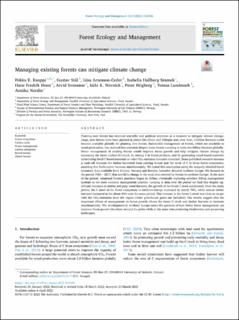Managing existing forests can mitigate climate change
Kauppi, Pekka E.; Stål, Gustav; Arnesson-Ceder, Lina; Sramek, Isabella Hallberg; Hoen, Hans Fredrik; Svensson, Arvid; Wernick, Iddo K.; Högberg, Peter; Lundmark, Tomas; Nordin, Annika
Peer reviewed, Journal article
Published version
Permanent lenke
https://hdl.handle.net/11250/3005683Utgivelsesdato
2022-04-06Metadata
Vis full innførselSamlinger
- Divisjon for skog og utmark [521]
- Publikasjoner fra CRIStin - NIBIO [4575]
- Vitenskapelige artikler [1416]
Sammendrag
Planting new forests has received scientific and political attention as a measure to mitigate climate change. Large, new forests have been planted in places like China and Ethiopia and, over time, a billion hectares could become available globally for planting new forests. Sustainable management of forests, which are available to wood production, has received less attention despite these forests covering at least two billion hectares globally. Better management of existing forests would improve forest growth and help mitigate climate change by increasing the forest carbon (C) stock, by storing C in forest products, and by generating wood-based materials substituting fossil C based materials or other CO2-emission-intensive materials. Some published research assumes a trade-off between the timber harvested from existing forests and the stock of C in those forest ecosystems, asserting that both cannot increase simultaneously. We tested this assumption using the uniquely detailed forest inventory data available from Finland, Norway and Sweden, hereafter denoted northern Europe. We focused on the period 1960 – 2017, that saw little change in the total area covered by forests in northern Europe. At the start of the period, rotational forestry practices began to diffuse, eventually replacing selective felling management systems as the most common management practice. Looking at data over the period we find that despite significant increases in timber and pulp wood harvests, the growth of the forest C stock accelerated. Over the study period, the C stock of the forest ecosystems in northern Europe increased by nearly 70%, while annual timber harvests increased at the about 40% over the same period. This increase in the forest C stock was close to on par with the CO2-emissions from the region (other greenhouse gases not included). Our results suggest that the important effects of management on forest growth allows the forest C stock and timber harvests to increase simultaneously. The development in northern Europe raises the question of how better forest management can improve forest growth elsewhere around the globe while at the same time protecting biodiversity and preserving landscapes.

